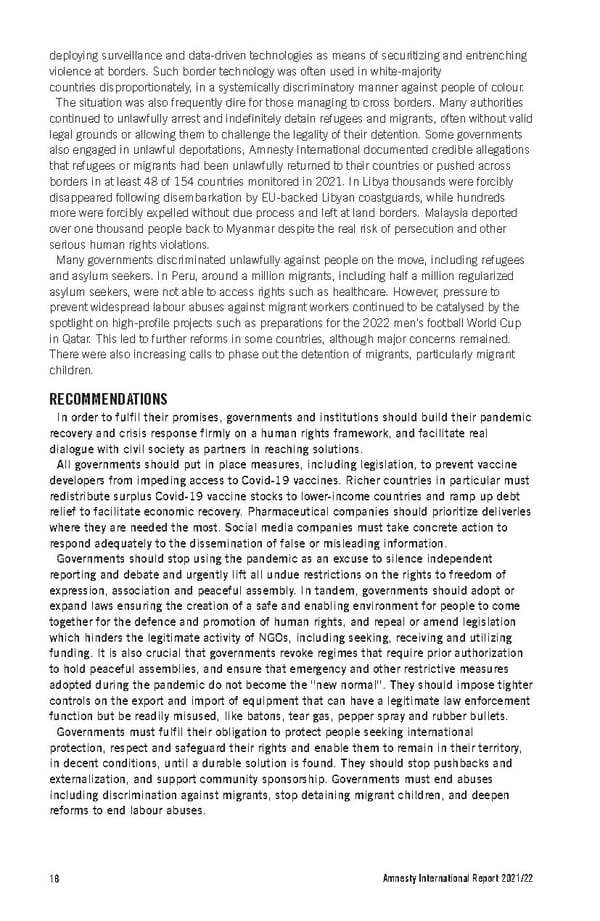deploying surveillance and data-driven technologies as means of securitizing and entrenching violence at borders. Such border technology was often used in white-majority countries disproportionately, in a systemically discriminatory manner against people of colour. The situation was also frequently dire for those managing to cross borders. Many authorities continued to unlawfully arrest and indefinitely detain refugees and migrants, often without valid legal grounds or allowing them to challenge the legality of their detention. Some governments also engaged in unlawful deportations; Amnesty International documented credible allegations that refugees or migrants had been unlawfully returned to their countries or pushed across borders in at least 48 of 154 countries monitored in 2021. In Libya thousands were forcibly disappeared following disembarkation by EU-backed Libyan coastguards, while hundreds more were forcibly expelled without due process and left at land borders. Malaysia deported over one thousand people back to Myanmar despite the real risk of persecution and other serious human rights violations. Many governments discriminated unlawfully against people on the move, including refugees and asylum seekers. In Peru, around a million migrants, including half a million regularized asylum seekers, were not able to access rights such as healthcare. However, pressure to prevent widespread labour abuses against migrant workers continued to be catalysed by the spotlight on high-profile projects such as preparations for the 2022 men’s football World Cup in Qatar. This led to further reforms in some countries, although major concerns remained. There were also increasing calls to phase out the detention of migrants, particularly migrant children. RECOMMENDATIONS In order to fulfil their promises, governments and institutions should build their pandemic recovery and crisis response firmly on a human rights framework, and facilitate real dialogue with civil society as partners in reaching solutions. All governments should put in place measures, including legislation, to prevent vaccine developers from impeding access to Covid-19 vaccines. Richer countries in particular must redistribute surplus Covid-19 vaccine stocks to lower-income countries and ramp up debt relief to facilitate economic recovery. Pharmaceutical companies should prioritize deliveries where they are needed the most. Social media companies must take concrete action to respond adequately to the dissemination of false or misleading information. Governments should stop using the pandemic as an excuse to silence independent reporting and debate and urgently lift all undue restrictions on the rights to freedom of expression, association and peaceful assembly. In tandem, governments should adopt or expand laws ensuring the creation of a safe and enabling environment for people to come together for the defence and promotion of human rights, and repeal or amend legislation which hinders the legitimate activity of NGOs, including seeking, receiving and utilizing funding. It is also crucial that governments revoke regimes that require prior authorization to hold peaceful assemblies, and ensure that emergency and other restrictive measures adopted during the pandemic do not become the “new normal”. They should impose tighter controls on the export and import of equipment that can have a legitimate law enforcement function but be readily misused, like batons, tear gas, pepper spray and rubber bullets. Governments must fulfil their obligation to protect people seeking international protection, respect and safeguard their rights and enable them to remain in their territory, in decent conditions, until a durable solution is found. They should stop pushbacks and externalization, and support community sponsorship. Governments must end abuses including discrimination against migrants, stop detaining migrant children, and deepen reforms to end labour abuses. Amnesty International Report 2021/22 18
 Amnesty International Report 2021/22 Page 17 Page 19
Amnesty International Report 2021/22 Page 17 Page 19